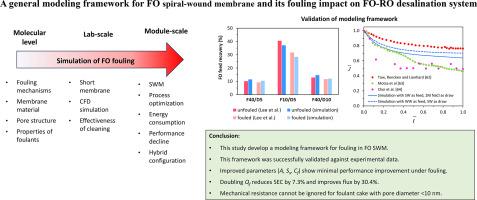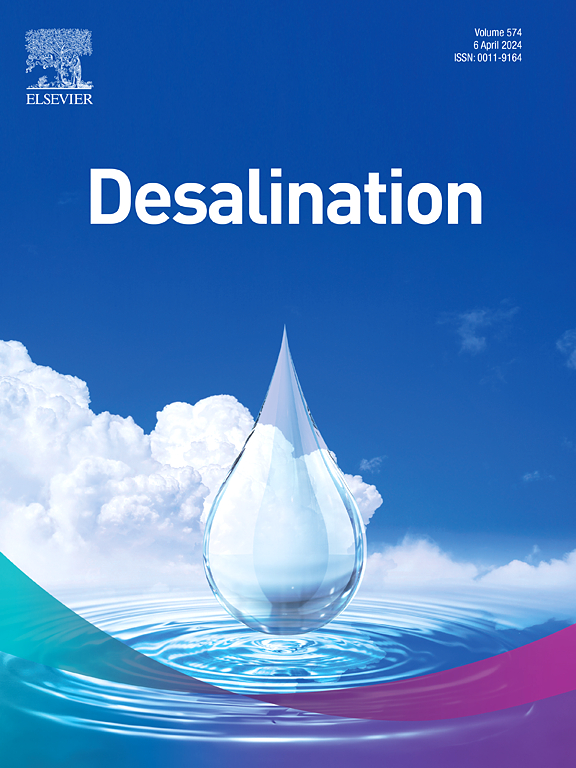A general modeling framework for FO spiral-wound membrane and its fouling impact on FO-RO desalination system
IF 8.3
1区 工程技术
Q1 ENGINEERING, CHEMICAL
引用次数: 0
Abstract
Modeling fouling in forward osmosis (FO) spiral-wound membrane (SWM) is challenging due to the time-dependent nature of fouling and the complex flow patterns induced by baffle. This necessitates the development of a general modeling framework for FO SWM module that prioritizes both accuracy and ease of implementation. This framework was validated against FO SWM experiment data from previous work, demonstrating a reasonable agreement with a maximum error of 13.1 % in FO permeate flux. This validated model was used to study the impact of fouling on feed recovery, a critical factor influencing specific energy consumption (SEC) in FO-RO desalination systems. While improved operating conditions and membrane parameters (A, Ss and Cf) initially lead to increased water flux, this effect was significantly counteracted by accelerated fouling. Consequently, performance improvements in terms of flux and SEC remained minimal (<1 %) under severe fouling conditions. The results show that for foulant cake with larger pore diameter (>10 nm), the contribution of hydraulic resistance is insignificant compared to osmotic resistance. However, the contribution of hydraulic resistance becomes important for foulant cakes with pore diameter smaller than 10 nm. This paper shows that modeling have evolved to a stage that they can be used to understand membrane fouling phenomena at the SWM module scale.

FO 螺旋缠绕膜的一般建模框架及其对 FO-RO 海水淡化系统的污垢影响
由于污垢的时间依赖性和挡板引起的复杂流动模式,对正渗透(FO)螺旋缠绕膜(SWM)中的污垢进行建模具有挑战性。因此,有必要为 FO SWM 模块开发一个通用建模框架,优先考虑准确性和易实施性。该框架与之前工作中的 FO SWM 实验数据进行了验证,结果表明两者之间存在合理的一致性,FO 渗透流量的最大误差为 13.1%。这个经过验证的模型被用来研究污垢对进料回收率的影响,进料回收率是影响 FO-RO 海水淡化系统特定能耗(SEC)的一个关键因素。虽然操作条件和膜参数(A、Ss 和 Cf)的改善最初会导致水通量的增加,但加速的污垢明显抵消了这一效果。因此,在严重污垢条件下,通量和 SEC 方面的性能改善仍然微乎其微(<1 %)。结果表明,对于孔径较大(10 nm)的污物滤饼,与渗透阻力相比,水力阻力的贡献微不足道。然而,对于孔径小于 10 nm 的污泥饼,水力阻力的贡献变得非常重要。本文表明,建模已发展到可用于了解污水处理模块规模的膜污垢现象的阶段。
本文章由计算机程序翻译,如有差异,请以英文原文为准。
求助全文
约1分钟内获得全文
求助全文
来源期刊

Desalination
工程技术-工程:化工
CiteScore
14.60
自引率
20.20%
发文量
619
审稿时长
41 days
期刊介绍:
Desalination is a scholarly journal that focuses on the field of desalination materials, processes, and associated technologies. It encompasses a wide range of disciplines and aims to publish exceptional papers in this area.
The journal invites submissions that explicitly revolve around water desalting and its applications to various sources such as seawater, groundwater, and wastewater. It particularly encourages research on diverse desalination methods including thermal, membrane, sorption, and hybrid processes.
By providing a platform for innovative studies, Desalination aims to advance the understanding and development of desalination technologies, promoting sustainable solutions for water scarcity challenges.
 求助内容:
求助内容: 应助结果提醒方式:
应助结果提醒方式:


